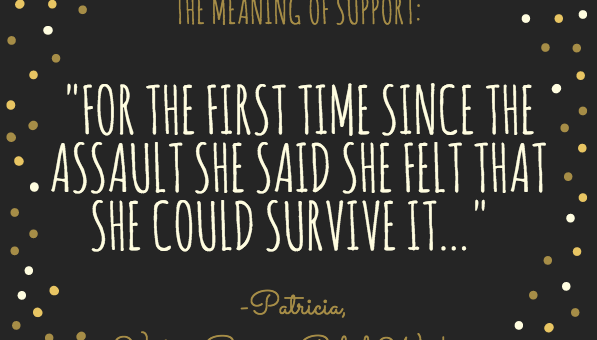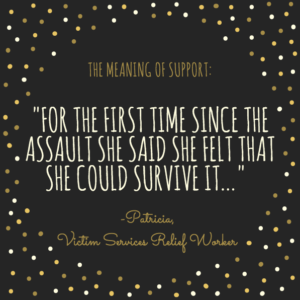
Victims and Survivors of Crime Week
Post by WAVAW Staff, Patricia
Four years ago, my friend was sexually assaulted while sleeping at my place. It was terrifying; sexual assault suddenly changed from a vaguely scary bogeyman in the dark to something horrifyingly personal and real. Every woman is taught from an unthinkably young age that it is our responsibility to not get raped; if we do, it is somehow automatically our fault. We all know the rules — they’ve been hammered into us our entire lives: walk with keys in hand, never leave your drinks, don’t wear revealing clothes, and never walk alone at night. Contort yourself, make yourself tiny enough to fit into this restrictive box and hopefully it will never happen to you. You will be as safe as you could possibly be.
 At the hospital that night, as I sat next to my friend on the bed while she shook with shock and fear, I was reeling. According to the rules, she should have been safe, this shouldn’t have happened; I couldn’t understand what we had done wrong, what rules she broke. Then, two women from WAVAW’s team of Victim Services workers met us at the hospital and immediately offered my friend unconditional, unflinching, and whole-hearted support and belief. They didn’t need to hear my friend’s story, they believed her unquestioningly. The relief and hope on her face was incredible. They knew she had done nothing wrong, that it was not her fault, and for the first time since the assault she said she felt that she could survive it. Those amazing women also planted a seed of understanding in my own mind. In the few minutes they stayed with us, my hazy concepts of rape culture, violence against women, and the meaning of support were fundamentally changed.
At the hospital that night, as I sat next to my friend on the bed while she shook with shock and fear, I was reeling. According to the rules, she should have been safe, this shouldn’t have happened; I couldn’t understand what we had done wrong, what rules she broke. Then, two women from WAVAW’s team of Victim Services workers met us at the hospital and immediately offered my friend unconditional, unflinching, and whole-hearted support and belief. They didn’t need to hear my friend’s story, they believed her unquestioningly. The relief and hope on her face was incredible. They knew she had done nothing wrong, that it was not her fault, and for the first time since the assault she said she felt that she could survive it. Those amazing women also planted a seed of understanding in my own mind. In the few minutes they stayed with us, my hazy concepts of rape culture, violence against women, and the meaning of support were fundamentally changed.
Sexual assault, no matter what the circumstances are, is never the survivor’s fault. Rape culture, this culture of oppression, silence, and blame that we live in, tries to tell us that as women, we are somehow at fault by merely existing. We are sexualized, marginalized, and silenced in enormous ways, like the more than 1000 missing and murdered Indigenous women in Canada or the Ghomeshi trial, and in small ways like being spoken over at work or cat-called on the street. Working at WAVAW is my way of resisting that constant pressure. It is an active, aggressive, outraged fight to reclaim myself and support others as they reclaim themselves in the face of a patriarchal society that would prefer we didn’t. Most importantly for me, it is a form of resistance that comes from empathy and connection. Being with survivors in their pain, anger, and confusion, validating and believing their experience without question means that person knows they are not alone. We are in this fight together.
- On June 3, 2016

